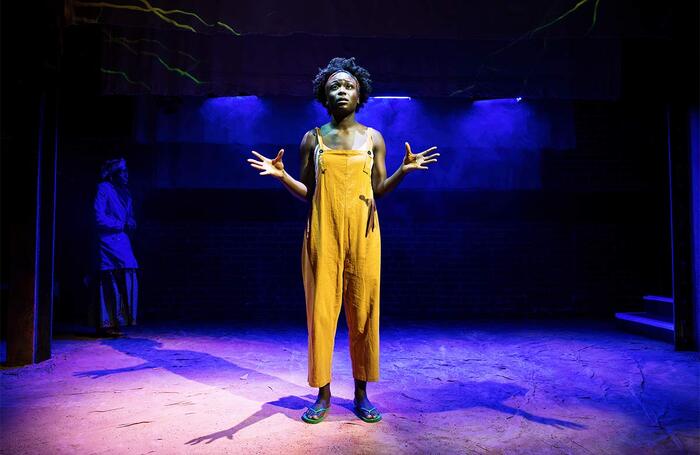Arcola Theatre, London – until 15 July 2023
Reviewed by Alun Hood
4****
The ongoing mania in theatre to make everything shorter – hence a 2 hour interval-free Romeo And Juliet at the Almeida, Tom Stoppard’s sprawling masterpiece Leopoldstadt returning as a (still powerful) one act drama post-pandemic and recently picking up the Tony Award for Best Broadway Play – means that occasionally a play can feel too brief to really flesh out the challenges it sets for itself. A case in point is Sasha Hails’s ambitious new piece Possession, which is so close to being a really great play but doesn’t give itself enough time and space to explore the fascinating and multitudinous issues it throws up. The list of trigger warnings almost feels longer than the second act of Oscar Pearce’s production.
I’m exaggerating of course, but there is a frustrating sense here of wonderfully rich seams of theme and story being sped up or under-explored just to bring the whole thing in at less than two hours total playing time. Hails’s characters are so engaging, her dialogue so real and riveting, that I could happily have spent up to another hour in their company.
According to a note in the published text, the play was borne from a sense of guilt the writer felt about wanting to continue to work after having a baby, and a further realisation that this was less a personal issue than a societal one. That alone is the basis of meaty drama but Hails goes further…much further. The play centres on four mothers: Kasamabayi, a Congolese immigrant who gives birth to her daughter Hope, who in turn becomes a mother before finishing school, on a London Transport bus, foreign correspondent Alice who is juggling single motherhood with a career on the most dangerous fringes of journalism, and another (non-fictional) Alice, the missionary Alice Seeley Harris, forced to leave her own children at boarding school in England at the beginning of the twentieth century while she and her husband worked in Congo, and whose photographic records of the atrocities and traumas inflicted on the native people by the colonising Belgian King Leopold form one of the earliest examples of a human rights campaign.
The play makes the intelligent equation between the rubber plantations where disobedient Congolese workers were randomly murdered or mutilated under the Belgians, and the present day cobalt mines in the region, where the rush for the blood mineral used in the manufacture of the phones, laptops and so on that keep the western world running, results in heinous human rights abuses to which big corporations seem happy to turn a blind eye. “We feed the world while we go hungry” cries justifiably angry Kinshasa-based young journalist David (Nedum Okoniya, playing multiple roles in a blazingly impressive professional debut). There is a rich and bitter irony in having modern day Alice (a devastatingly powerful Dorothea Myer-Bennett) deliver an impassioned to-camera speech about the injustice and accountability of the situation only to be interrupted by the sound of her own mobile going off.
The play goes on to consider rape as a method of weaponry in war, the legacy of human behaviour down the ages, collective responsibility, the potential conflict between religion and living an authentic life …it’s all here, and it’s vital, important stuff. It’s just too much for one short play to bear. I feel like Possession needs to go big, or go on the screen. Personally I could have lived without the soap operatic almost-romance between the two war zone journalists. Although beautifully played by Myer-Bennett and Milo Twomey, it adds little to the play as a whole and feels incongruous. Similarly, the sections where one of the characters, now dead, pontificates on the nature of life and living feel strangely undernourished yet overwritten.
Hails’s script switches between present day and nineteenth century Congo and London, and between the earthly plane and a higher one, with a refreshing boldness, matched by Pearce’s confident, dynamic direction, that feels part filmic and part ritual. The almost wordless opening section, which sees a distressed, displaced Kasambayi (Sarah Amankwah, utterly brilliant) going into labour atop a bus at Victoria while a kaleidoscope of London lives rushes around her, is a brilliant piece of staging (movement director: Tian Brown-Sampson), and the simple but striking set (by Sarah Beaton) of saffron coloured sheets (useful as screens for some unsettling examples of Alice Seeley Harris’s actual photographs) suspended over terra cotta coloured earth gives a credible impression of both heat and other-worldliness.
The cast are all superb, but it’s the women that get the greater opportunities to shine. Diany Samba-Bandza projects an innate niceness as well as a sense of frustrated wonder as the pivotal Hope, and also doubles exquisitely as Mercy, the child who tears apart many of Seeley Harris’s beliefs and preconceptions with that matter-of-fact carelessness kids can have. Ms Samba-Bandza looks like a star waiting to happen. Amankwah is so convincing as the fierce yet resigned, and ultimately totally admirable, Kasambayi, that it barely feels like acting. Myer-Bennett is equally astonishing, giving each Alice a rich inner life, and she movingly conveys the conflicts between being a mother and a relevant citizen in the world. The showdown (actually more of a walk-over) scene between Amankwah’s Kasambayi and Myer-Bennett’s modern Alice is quite something to witness.
Given the immensity of the drama and the themes, it’s surprising perhaps how much humour Hails has managed to weave into this already intricate tapestry. It’s a very welcome addition. All in all, a play this ambitious is unlikely to be without its flaws and purple patches, but it’s an impressive achievement, and gives audiences much to think about after. I just wanted more of it!

